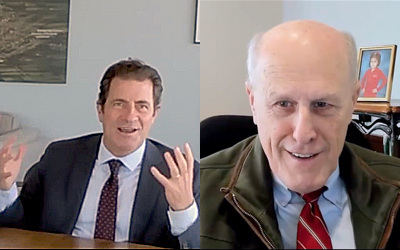Dean Mark Gladwin Shares School of Medicine’s Successes During ‘Face to Face’
November 21, 2023 Alex Likowski
Fifteen months after becoming dean, he also talks about the future of medicine and of teaching medicine.
“The integration of ‘big data’ with artificial intelligence and immersive technologies in health care is fundamentally changing the way we will treat patients — enabling us to vastly improve and personalize care for each individual,” University of Maryland School of Medicine (UMSOM) Dean Mark Gladwin, MD, said almost exactly one year ago announcing the launch of the Institute for Health Computing (IHC). It’s an ambitious collaboration between the medical minds at the University of Maryland, Baltimore (UMB), the computing power of the University of Maryland, College Park, and the University of Maryland Medical System with the anonymized health records of 2 million unique patients each year.
But IHC is just one of the big things happening at the School of Medicine. Gladwin was interviewed by UMB President Bruce E. Jarrell, MD, FACS, Nov. 16 on Virtual Face to Face with President Bruce Jarrell.
“What's sort of the next step for this school? In terms of let's start with research growth?” Jarrell began. “Where do you see the biggest advances forward?"
“There's a need to move from under the shadow of the great pandemic,” Gladwin said, adding that during COVID-19, researchers were largely isolated, while clinicians continued their work in clinics. “So, part of it is how do we leverage all this great success of the 17 departments and 25 research centers? But how do we come together, to break down silos and to stimulate team science that that will make an even bigger difference?"
The great successes to which Gladwin referred are manifold. Two months ago, UMSOM doctors performed just the second-ever xenotransplantation of a heart into a living human patient, advancing science that might save the lives of 6,000 Americans who die each year waiting for an organ transplant and many more who need an organ, but don’t even qualify to be on the organ transplant list.
The school also received a major gift — $10 million — from the Kahlert Foundation to launch the Kahlert Institute for Addiction Medicine. Research there will focus on developing and testing novel interventions, including behavioral therapies, drugs, and innovative technologies to reduce cravings and drug use, and overcome the many complications of addiction facing Americans diagnosed with substance use disorder — there were 20 million last year.
“This is going to focus on basic science,” Gladwin explained. “How do we turn off addiction? How do we prevent addiction? How do we run clinical trials as we discover new things? And then excellent clinical care, which we now can project across the state. We have telemedicine, addiction treatment programs that serve our jails, and serve patients across the state.”
Another multidisciplinary research effort — the University of Maryland Institute for Neuroscience Discovery, or UM-MIND institute — will seek better understanding of the human brain, working to address fundamental diseases of the brain like Alzheimer's, autism, brain injury, brain inflammation, and neurodegeneration, Gladwin said, by facilitating interaction between basic and clinical scientists and enhancing collaborative research.
“We've created an institute that crosses the clinical domains of neurosurgery, neurology, psychiatry, physical therapy, and then crosses basic science domains like primary fundamental neuroscience, and then brings those groups together in this transdisciplinary institute,” Gladwin said.